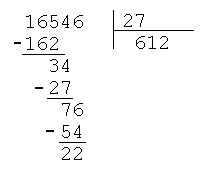DIVV8
MOVF TEMPY8,F
BTFSC STATUS,Z ;SKIP IF NON-ZERO
RETURN
CLRF RESULT8
MOVLW 1
MOVWF IDX16
SHIFT_IT8
BCF STATUS,C
RLF IDX16,F
BCF STATUS,C
RLF TEMPY8,F
BTFSS TEMPY8,7
GOTO SHIFT_IT8
DIVU8LOOP
MOVF TEMPY8,W
SUBWF TEMPX8
BTFSC STATUS,C
GOTO COUNT8
ADDWF TEMPX8
GOTO FINAL8
COUNT8
MOVF IDX16,W
ADDWF RESULT8
FINAL8
BCF STATUS,C
RRF TEMPY8,F
BCF STATUS,C
RRF IDX16,F
BTFSS STATUS,C
GOTO DIVU8LOOP
RETURN
|
SUB16
MOVF TEMPY16_H,W
MOVWF TEMPYY
MOVF TEMPY16,W
SUBWF TEMPX16
BTFSS STATUS,C
INCF TEMPYY,F
MOVF TEMPYY,W
SUBWF TEMPX16_H
RETURN
ADD16BIS
MOVF TEMPY16,W
ADDWF TEMPX16
BTFSC STATUS,C
INCF TEMPX16_H,F
MOVF TEMPY16_H,W
ADDWF TEMPX16_H
RETURN
DIVV16
MOVF TEMPY16,F
BTFSS STATUS,Z
GOTO ZERO_TEST_SKIPPED
MOVF TEMPY16_H,F
BTFSC STATUS,Z
RETURN
ZERO_TEST_SKIPPED
MOVLW 1
MOVWF IDX16
CLRF IDX16_H
CLRF RESULT16
CLRF RESULT16_H
SHIFT_IT16
BCF STATUS,C
RLF IDX16,F
RLF IDX16_H,F
BCF STATUS,C
RLF TEMPY16,F
RLF TEMPY16_H,F
BTFSS TEMPY16_H,7
GOTO SHIFT_IT16
DIVU16LOOP
CALL SUB16
BTFSC STATUS,C
GOTO COUNTX
CALL ADD16BIS
GOTO FINALX
COUNTX
MOVF IDX16,W
ADDWF RESULT16
BTFSC STATUS,C
INCF RESULT16_H,F
MOVF IDX16_H,W
ADDWF RESULT16_H
FINALX
BCF STATUS,C
RRF TEMPY16_H,F
RRF TEMPY16,F
BCF STATUS,C
RRF IDX16_H,F
RRF IDX16,F
BTFSS STATUS,C
GOTO DIVU16LOOP
RETURN
... somewhere in the code CALL DIVV16 |
